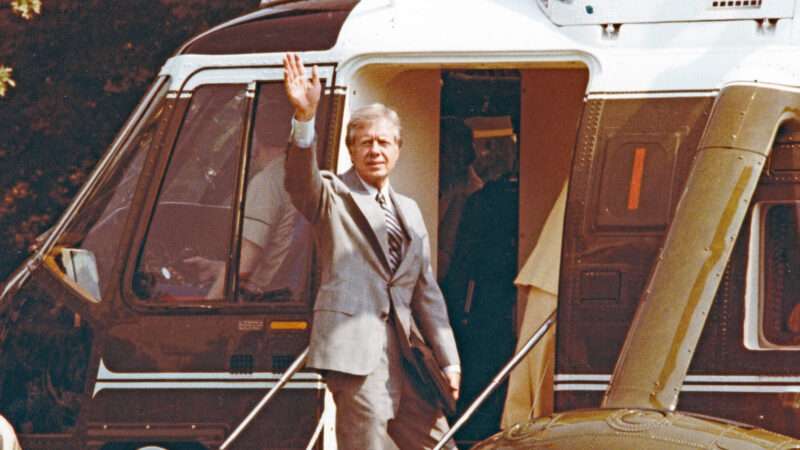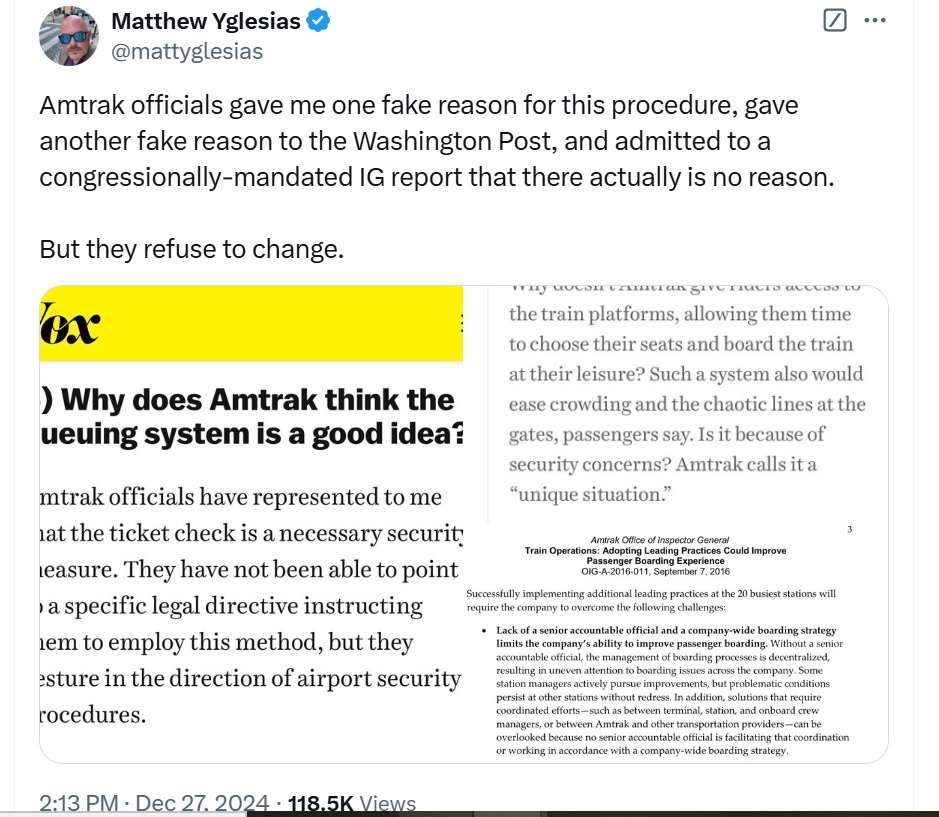
Jimmy Carter, America's 39th president, died Sunday. Carter won a Nobel Peace Prize for his humanitarian work, served one term as governor of Georgia, and was the oldest former president in American history—he turned 100 three months ago. As The New York Times notes, Carter "outlived not only his wife but his vice president, most of his cabinet, key aides and allies as well as the Republican president he defeated and the Republican challenger who later defeated him."
Carter is not typically remembered as a successful president. For Republicans in particular, he's long been a useful punching bag—a liberal foil to the conservative greatness of the Reagan mythos. He's remembered for bad economic times, for the Iranian hostage crisis, and as an almost accidental president from a time when the Democratic Party couldn't figure out what it wanted and the Republican Party was still suffering its Nixon hangover.
That historical reputation deserves a reassessment, argues Gene Healy, a vice president at the Cato Institute and the author of The Cult of the Presidency. While Carter's "narrow focus on the problems of the moment" left him without much of a grandiose legacy, it also "made significant improvements in American life," Healy writes:
In an era of strongman politics, when the presidency has become the focal point of all too much passion, there's a lot to be said for James Earl Carter's comparatively modest conception of the office. At home, our 39th president left a legacy of workaday reforms, paving the way for the "Reagan boom" by taming inflation and serially deregulating air travel, trucking, railroads, and energy. Abroad, he favored diplomacy over war, garnering the least bloody record of any post–World War II president. So what if he didn't look tough, or even particularly competent, as he did it? A clear-eyed look at the Carter record reveals something surprising: This bumbling, brittle, unloveable man was, by the standards that ought to matter, our best modern president.
Carter's greatest accomplishment as chief executive was getting the government out of Americans' lives in myriad ways. His deregulation of home brewing, for example, helped usher in the modern craft beer movement, and that has created jobs at brewpubs in every city and town in the country. Carter's deregulation of the interstate trucking and freight rail industries injected new competition into cartels that had long operated under government protection. Similar changes to federal rules governing commercial airfare made it cheaper and easier for Americans to travel long distances to see friends and family (which makes it fitting that Carter passed away during the busiest travel season ever).
Carter left the White House at age 56 and enjoyed a decadeslong post-presidency that included winning the Nobel Peace Prize in 2002. That feels a bit out of place in modern American politics. Indeed, with Carter now off the list, the country's two oldest living presidents are now the current president, Joe Biden, and the president-elect, Donald Trump, who have spent their twilight years grasping after political power.
Check out Nick Gillespie's interview with another Nobel Prize winner—economist Vernon Smith—for more on Carter's deregulatory accomplishments:
Regrets, he's got a few. Like Carter, Biden is leaving office under a cloud of defeat—but without big deregulatory accomplishments that might someday inspire a reassessment of his tenure.
As he heads for the door, Biden still believes he would have won this year's presidential race, The Washington Post reports. That's despite his sinking poll numbers after the shockingly bad June debate that ultimately forced him from the race.
Biden's other regrets, per the Post's reporting, include appointing Merrick Garland to run the Department of Justice (because Garland did not move quickly enough to prosecute Trump) and failing to scrawl his own name, Trump-style, across the federal stimulus checks mailed to millions of Americans in early 2021.
Scenes from Washington, D.C. Amtrak officials apologized for ruining dozens of holiday plans after a train departed from Union Station without first allowing passengers to board. More than 100 passengers were left behind, The Washington Post reports.
The incident cuts a bit deeper for me, since the train was running on the Roanoke, Virginia, to New York City route that I occasionally use to commute from Culpeper to the rest of the Northeast Corridor. More importantly, the incident might prompt officials at D.C.'s Union Station to finally abandon an asinine boarding process that unnecessarily requires passengers to wait in the station itself rather than trackside.
As Matt Yglesias pointed out on X, Amtrak and Union Station don't seem to know why this confusing boarding process exists.

An even better solution: Abolish Amtrak.
QUICK HITS
- Donald Trump voiced support for H-1B visas, which allow highly skilled foreign workers to enter the country temporarily and have drawn the ire of some nativists in Trump's orbit. Trump says he employs workers on H-1B visas at his hotels and golf clubs, but it seems likely that Trump is thinking of H-2B visas, which are granted to temporary unskilled workers. And Trump limited H-1B visas while he was president, claiming that those workers took jobs from Americans. So this is what the next four years are going to be like, I guess.
- The number of murders across the U.S. declined by about 16 percent in 2024 relative to 2023, according to preliminary data from the FBI.
- A plane crash in South Korea killed 179 people.
- Instacart and Uber are challenging a new law in Seattle that makes it harder to fire gig workers.
- Independence for New Caledonia?
The post Final Farewells appeared first on Reason.com.







